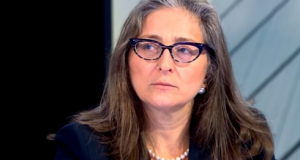 Since pre-history there has been a proliferation of gods and hence a need to name them. When Judaism abandoned the many in favour of the one (about 4,000 years ago), this ‘one’ god needed no name and thus it was deemed blasphemous to pronounce that name – YHVH or Yahweh or Jehovah. Since ancient/classic Hebrew has no vowel marks nikkud (the Arabic in the Qu’ran has no ḥarakāt), no-one knows how it should be pronounced. To say ‘god’ therefore acknowledged and confirmed your belief in ‘the one god’.
Since pre-history there has been a proliferation of gods and hence a need to name them. When Judaism abandoned the many in favour of the one (about 4,000 years ago), this ‘one’ god needed no name and thus it was deemed blasphemous to pronounce that name – YHVH or Yahweh or Jehovah. Since ancient/classic Hebrew has no vowel marks nikkud (the Arabic in the Qu’ran has no ḥarakāt), no-one knows how it should be pronounced. To say ‘god’ therefore acknowledged and confirmed your belief in ‘the one god’.
What started as an offence against ‘god’ has become a perceived offence or insult against people who believe in a god(s) or a religion or a sacred object. Theocratic governments do not recognise the right to free speech or its advantages. In Saudi Arabia and Pakistan for instance, almost anything can be taken as blasphemous, resulting in many infringements on Human Rights including imprisonment and death. But in democracies, the UN Council of Human Rights (2006) upholds the rights of all, including those of other religions, non-religious and atheist. A ‘sacred good’ cannot be exclusive to religion, and religious practices may be deemed equally offensive to an atheist who values free speech and Human Rights as ‘sacred’.
‘…it would be impermissible for any such laws to discriminate in favour of or against one or certain religions or belief systems, or their adherents over another, or religious believers over non-believers.’[1]
In multi-cultural, democratic societies misunderstandings often lead to the isolation of minority groups, creating a subculture of victimisation and perceived lack of respect and insult. The history of democracy teaches respect for its members as reasonable, thinking people, entitled to their opinions but not immunity from offence. This clash of ideologies presents humankind with a dilemma – where to draw the line between what is the legitimate use of ‘free speech’ laws and so-called ‘hate speech’ (deliberate incitement to discrimination and violence)? At the present time, the line is somewhat blurred and liberal progressives, by allowing ‘hate speech’ against the secular, insidiously undermine the legitimate political condition of democratic society.
Voicing an opinion that questions the beliefs of an individual or group can denote respect for that individual/group’s autonomy as an equal member of society. An example would be – support for the Palestinians is respecting and honouring the Jewish people who died in the Holocaust, by anathematising the segregation and persecution of a group because of religion or race, even though this may perceived as an attack on Zionists in Israel.
Resolution 16/18: ‘…combating intolerance, negative stereotyping and stigmatization of, and discrimination, incitement to violence, and violence against persons based on religion or belief.’[2]
It may seem inconceivable to some that a ‘blasphemer’ can legitimately be demonstrating respect towards a group through this means[3] and marks religious blasphemy as a crime, non-transferable from a theocracy to a democracy. There is no moral right for an atheist, or the adherent of any religion, to refrain from interrogating another’s definition of the ‘sacred’.
[1] Submission to the UN Human Rights Council: 14th Session of UPR Working Group 2012
[2] UN Human Rights Council: Article 19 Briefing note 2015
[3] Dacey, Austin: The Future of Blasphemy. New York 2012
Writer: Kay Saxon
The writer is a UK based columnist working with THE PASHTUN TIMES. She is graduated from the University of Central Lancashire, North of England. She can be reached at
kaysaxon@hotmail.co.uk
ALL RIGHTS RESERVED WITH THE PASHTUN TIMES
 Pashtun Times Latest News
Pashtun Times Latest News



